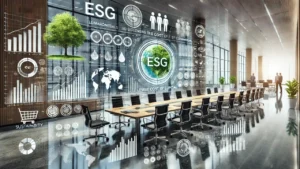ESG Is Not an Add-On. It Is the Architecture of Future Value
The transformation that we are currently experiencing in the GCC is fundamental. Saudi Vision 2030 and the UAE’s Net Zero 2050 are not sustainability strategies that exist in isolation. They are economic transformations that necessitate the integration of sustainability into infrastructure, finance, policy, and regulation.
However, numerous organizations continue to evaluate ESG from a compliance perspective.
The outcome? A growing mismatch between corporate readiness and policy ambition, missed investor expectations, duplicated frameworks, and superficial reporting.
This is precisely the reason IFRS Lab was established: to assist businesses in the transition from ESG initiatives to ESG architecture, an internal operating model that integrates disclosure, impact, and performance.
Holistic Means Connected: Bridging Data, Strategy, and Impact
We do not define ourselves as sustainability consultants.
We define ourselves as translators between sustainability ambition and business execution. That is a critical distinction.
At the heart of our work lies integration between sustainability and finance, between frameworks and feasibility, between policy and practice. And integration cannot happen in silos.
We begin with materiality not as a reporting input, but as a risk and strategy lens. Our double materiality assessments are designed to:
- Identify sustainability impacts and financial implications
- Prioritize issues that affect enterprise value over time
- Enable structured decision-making in boards and leadership teams
From there, our carbon accounting, ESG strategy development, and sustainability-linked reporting are all built using audit-grade data inputs, proprietary scoring tools, and industry-aligned benchmarks.
Compliance Is the Entry Ticket
One of the most common conversations I have with clients is about standards fatigue. GRI. ISSB. CSRD. TCFD. SEC. SASB. The acronyms keep growing—and so does the confusion.
Our philosophy is simple: compliance is a foundation. Not a differentiator.
At IFRS Lab, we decode these frameworks not just to meet regulatory expectations, but to position clients for long-term market advantage. That includes:
- Embedding ISSB-aligned disclosures in management systems
- Mapping GHG Protocol Scope 1, 2, and 3 data into business unit KPIs
- Integrating CSRD double materiality into enterprise risk registers
- Aligning with the UAE’s ESG Index expectations for private equity visibility
Because, for us, sustainability disclosures should reveal business potential, not just satisfy policy.
That’s the mindset we bring.
The Convergence of Finance and Sustainability Has Already Happened
When I speak to CFOs, I often emphasize one point: sustainability is no longer your auditor’s problem. It is your capital strategy.
Today, lenders and asset managers use ESG ratings as a risk lens. Sovereign wealth funds in the GCC allocate based on ESG integration maturity. Bond issuers are increasingly expected to tag green, blue, or social outcomes.
This is where IFRS Lab’s core strength lies.
We understand the financial mechanics of ESG. Our advisory work covers:
- Structuring of sustainability-linked bonds (SLBs) and green sukuks
- Transition risk mapping for climate-sensitive industries
- Integrating ESG KPIs into management dashboards and investor decks
- Enabling CSRD and SFDR readiness for EU-linked financing
For many mid-market companies in the UAE, this has meant the difference between qualifying for climate finance—or being left behind.
Technology Is the Next Frontier—But Data Integrity Comes First!
We are not here to automate greenwashing.
With AI-driven tools now flooding the ESG ecosystem, the temptation to “generate” data is high. But we believe sustainability intelligence must be:
- Verifiable
- Consistent
- Audit-ready
That is why we invest heavily in data infrastructure. We use ESGEO as our partner platform to help clients centralize, clean, and validate sustainability data—across facilities, suppliers, and timelines.
But more importantly, we train clients to internalize these processes, so they do not remain dependent on consultants indefinitely.
Our People Are Not Just Experts. They Are Interpreters of Change
Our team includes sustainability analysts, accountants, engineers, and policy specialists. But technical expertise alone is not enough.
We prioritize multi-disciplinary intelligence.
This means every engagement is approached with a system thinking mindset. Our people ask: How does climate regulation affect supply chain design? How do energy audits intersect with tax incentives? How can HR practices support gender equity disclosures?
Our internal learning programs include:
- Regular upskilling on GRI, ISSB, TCFD, CSRD
- Participation in WBCSD, IFRS, and UNGC working groups
- Continuous training in digital tools and ESG impact assessment models
This enables us to offer not just solutions but The Foresight.
Regional Context Is the Core of Credibility
The GCC is not Europe. The UAE is not California. ESG solutions cannot be copy-pasted from global whitepapers.
That is why contextualization is our competitive edge.
We work with clients to align sustainability roadmaps with:
- Local economic diversification agendas (Vision 2030, Net Zero 2050, etc.)
- Sector-specific mandates (Dubai Supreme Council of Energy, SEC, etc.)
- Cultural sensitivities and reporting maturity levels
- Islamic finance principles, where applicable
This localized intelligence allows us to deliver globally aligned yet regionally relevant strategies—backed by technical rigor and stakeholder understanding.
Final Thoughts: Sustainability Is Not the Goal. It Is the Means.
Sustainability is not about being good. It is about being prepared.
Prepared for investor expectations. Prepared for regulatory acceleration. Prepared for the climate reality that is already reshaping how capital, talent, and innovation flow.
At IFRS Lab, we are not here to decorate annual reports. We are here to build resilient, data-driven, future-ready businesses—across the GCC and beyond.
And we invite those ready for real transformation to start now.
About the Author
Osman Masood is the Co-Founder and Managing Partner of IFRS Lab, a Dubai-based sustainability and financial reporting advisory firm. He is a thought leader in ESG strategy, carbon accounting, and integrated reporting, with a focus on helping GCC businesses transition towards future-proof, audit-grade sustainability systems. Osman is also a frequent contributor to regional ESG policy dialogues and an advocate for capacity-building across public and private sectors.





